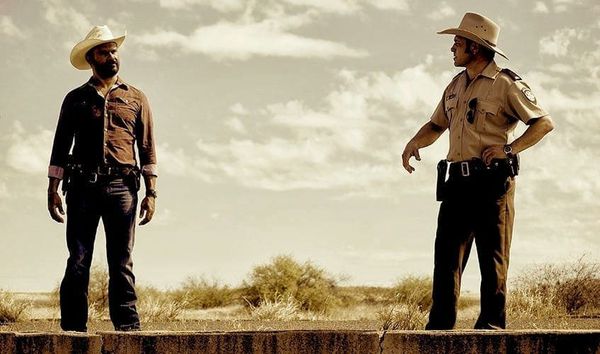Eye For Film >> Movies >> Mystery Road (2013) Film Review
Mystery Road
Reviewed by: Anton Bitel

When, with his previous, excellent feature Toomelah, Ivan Sen forced viewers to look hard at the long-term after-effects of historical mistreatment and abuse on a small town's Aboriginal population, he sugared the pill with the barest ghost of genre tropes to remind us that it was not merely a stylised documentary that we were watching. Now, in Mystery Road, genre comes much more to the fore, although that in no way means that the polyhyphenate filmmaker (here writing, directing, shooting, editing and composing the score) has somehow turned his back on indigenous issues.
Mystery Road opens as a 'trucky' pulls over to check his rig's tyres in the brilliant ochre of an outback dawn, and hears the sound of a wild dog coming from the creek below. "How did he know it was a wild dog?" is what both investigating detective Jay Swan (Aaron Pederson), recently returned from a stint in the Big Smoke, and local coroner Jim (Bruce Spence) will ask - a question that cuts to the heart of a nation where the boundaries between civilisation and savagery have often been blurred. For, in a storm drain under the highway, the driver has discovered the body of Aboriginal teenager Julie Mason, her throat slit and her arm bitten. The road sign over the drain reads 'Massacre Creek' - which is all at once a marker of genre, and a reminder of very real local history.

Mystery Road is peppered with these double-dealing gestures towards genre. The fact that an out-of-town motel is called Dusk Til Dawn (in reference to the similarly titled Robert Rodriguez/Quentin Tarantino film) points to the ghastly predations that have gone on there. The fact that a local criminal wears a hockey mask evokes a whole filmic history of slaughter (via the Friday The 13th franchise), even if his eventual unmasking points to something altogether more grounded and insidiously shocking. A reference to a 'superdog' also suggests something far more absurdly generic than Sen ever delivers - and even Jim concedes, "that's just a bit of trivia". Yet all this is the filmmaker's way of limning all too real Antipodean horrors experienced day to day by the native community. "For some," as Jay tells his Sergeant, "this is already a warzone."
As Jay, wearing a Stetson and carrying his father's '68 Winchester .308, decides to make a lone stand for his beleaguered community against a gang of evildoers (a mix of thugs, ranchers and lawmen), Sen, like Patrick Hughes before him with Red Hill, creates a Great Southern western, using the iconography of the oater to show the Australian landscape as something akin to the shifting boundaries (geographical, moral, racial) of America's wild, wild cowboy days. Jay, who is himself indigenous and who faces unrestrained racism (from some) in his police work, brings the fight to the drug manufacturers and dealers who are destroying his people, even as he uses full beer bottles for his target practice - in what is a clear allusion to (and exorcism of) the alcohol addiction that killed his own father and has been a historical bane upon Aboriginal communities. Meanwhile, as Jay struggles to connect with his estranged daughter, he faces that other scourge on indigenous populations, the disintegration of family structures.
Investigating Julie's murder, Jay follows a desperate trail of meth labs, teen prostitution and police corruption, and along the way drifts through an acting ensemble that places big box-office draws (Hugo Weaving, Jack Thompson and Ryan Kwanten) alongside several of the less known faces from Toomelah (Daniel Connors, Danieka Connors), in casting which feels as much like a microcosm of Australia as the small Queensland town at the film's centre. For in Mystery Road, Sen has crafted a tense thrill ride without ever forgetting his roots, and the results expose the state of a nation in a very engaging format.
Reviewed on: 25 Sep 2013















